While beaming public service advertisements on frequent handwashing, the state government forgot that 2 million Mumbaikars have been denied legal access to water
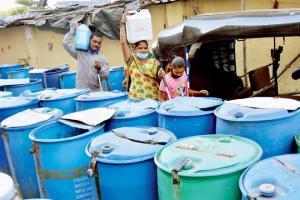
Dhananjay Bhagat and his wife Anita, who are visually impaired, have to walk a distance of 50 metres through the Siddharth Nagar slum to fill water daily. Pics/Sayyed Sameer Abedi
Every day, Dhananjay Bhagat and his wife Anita take the narrow alleyways of an informal settlement in Andheri's Siddharth Nagar.
The trip is to a communal tap to fill two jerrycans of water and haul them back to their shack. Their visual impairment doesn't help. The couple wonders how hygiene, one of the pillars in the prevention of the Coronavirus infection, is practical in Mumbai.
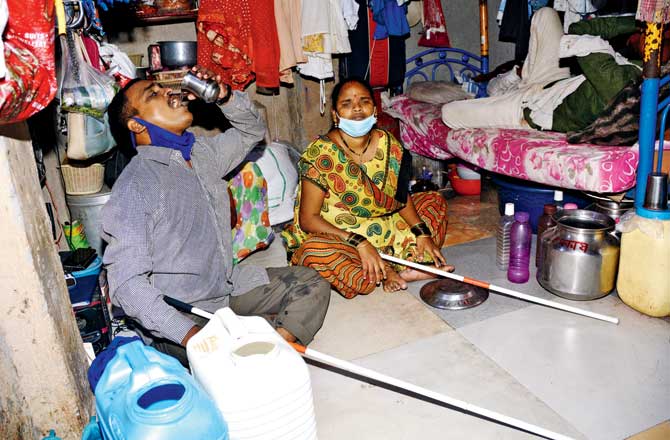
The ongoing concern about lack of sanitation facilities has been compounded by news that urban slums are uniquely vulnerable to COVID-19. "But fetching water is essential. The government has instructed everyone to wash hands regularly. How else can we keep the virus at bay?" asks Dhananjay, 35. On some days, his mother-in-law steps in to help. "She works as a domestic help. Until the nationwide lockdown was imposed, she would bring 20-litre gallons of potable water from her employers' homes. But after she lost her job in the pandemic, she queues up with us at the local water standpost," he says. The Bhagat family of six members requires an additional 200 litres for household use, including bathing, and washing clothes and dishes. A BMC contractor's water tanker caters to this need. "We don't have a direct water connection in our home, so we rely on the tankers that come once a day. There is never a fixed timing, so we have to line up with buckets and just wait. The price isn't fixed either. Sometimes they charge us Rs 30 for 200 litre water; sometimes, more. We are all out of jobs, so it is getting difficult to cough up this money."
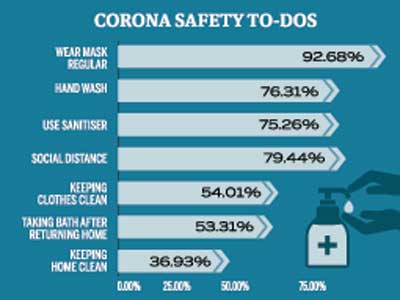
Percentage of people from total respondents aware of various safety measures to prevent infection. Credit/Pani Haq Samiti
Fifteen kilometres away in Dattani Park area of Kandivli East, a similar story unfolds with Suresh Chavhan, 34. He used to do odd jobs of laying paver blocks on footpaths, but has been jobless for eight months. He spends R300 every day on buying water for domestic use. "I have two older sons, who are put up in a hostel. My wife and I live with our six-year-old son. We don't care about us, but his health is important. We line up every day outside a public toilet in the area to buy water. We have seen a horrible time in the pandemic, and have had to go days without a drop," he says. When this writer asks him, what about drinking water, he laughs. "Do you think we can afford that? We use cleaning water for both drinking and cooking."
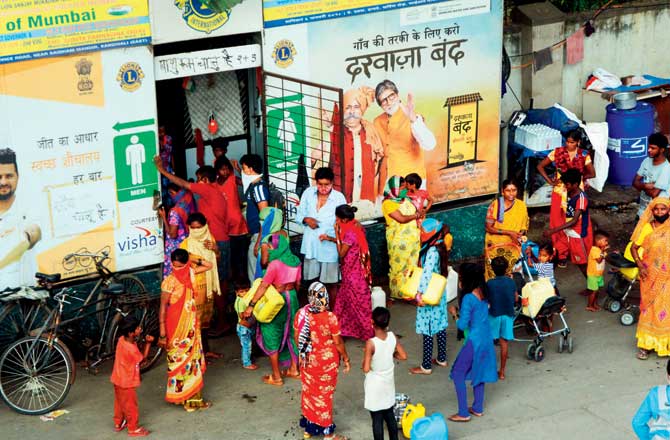
Suresh Chavhan stands in a queue outside a public toilet in the area
Government-enforced social isolation may help relatively affluent populations limit the spread of COVID-19, but these measures can be devastating for the nearly one billion people around the globe currently dwelling in urban slums, where physical space is scarce, limited or no access to water, with many relying on daily wage labour for survival. A report published on April 24 in the Journal of Urban Health, authored by a team of public health experts and epidemiologists working in collaboration with community leaders and NGOs from urban slums around the world, offers eight urgent recommendations for reducing the impact of COVID-19 on people living in poverty. Topping the list is a call for governments to partner with existing community leadership and NGOs to form emergency planning committees that can consider the unique social, economic and cultural needs of the community in charting the appropriate response, rather than relying on top-down directives.
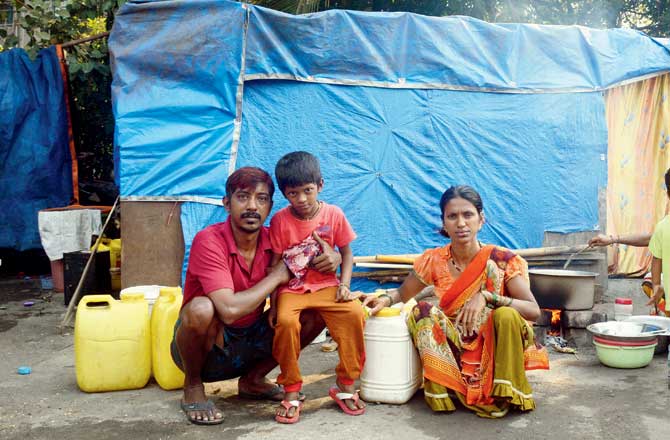
Where water is sold at an exorbitant price. Chavhan and his wife live with their six-year-old son on the service road in Dattani Park, Kandivli East
Mumbai-based Pani Haq Samiti (PHS) conducted a survey focusing on the impact of COVID-19 and the lockdown on the city's underprivileged population. PHS is a collective of community leaders from 54 peoples' settlements across 17 administrative wards of Mumbai. Founded in 2007, it has been at the forefront of the movement towards universal water and sanitation access in the city. It has documented 62 communities that are denied legal water connections. Sitaram Shelar, a water activist and convenor of PHS, says, "These populations comprise auto and taxi drivers, domestic help, migrant workers, daily wage labourers and even the homeless. They are spread from Dahisar's Ganpat Patil Nagar, Tardeo's Janata Nagar, M-East ward's Shivaji Nagar, Rohidasnagar in Lower Parel to Geeta Nagar and Ambedkar Nagar in Colaba. Before the pandemic, they relied on springs, ponds and wells for water. The survey found out that nearly 24.4 per cent respondents did not receive daily water supply and 19.31 per cent could not access safe potable water from any source during the lockdown. These are worrying figures."
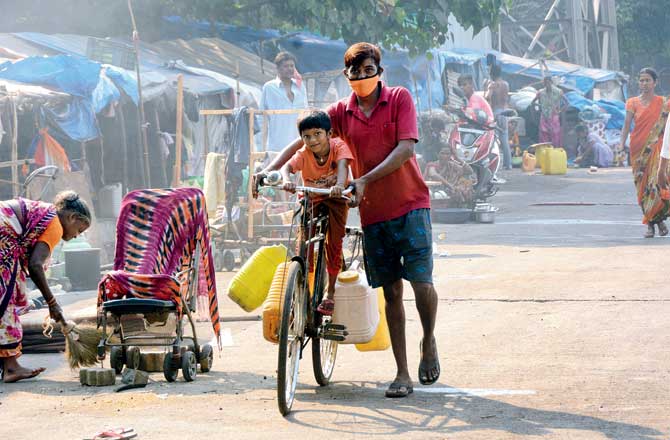
They use domestic water to wash clothes as well as for drinking. Pics/Satej Shinde
Before setting the survey in motion, Shelar wrote to the BMC commissioner, requesting that water standposts be provided, albeit temporarily, on humanitarian grounds. "We told the corporation that if these people do not get access to water, they will be exploited by contractors who will demand more money in exchange of a few gallons of water. We also wrote to the hydraulics department, but heard back from the officer that this wasn't the right time to talk about the problem. We didn't get a response from the BMC either," he recalls. Left with no choice, PHS took their appeal to the Bombay High Court. "The HC instructed us to write back to the BMC, and assured that the court would step in if the civic body failed to respond this time. Almost 32 communities signed a letter and we CC'ed the District Legal Services Authority on the email. When we didn't hear back, we approached the court again, but were told that this wasn't a good time to pressure the state government when all resources were being used to fight the pandemic," Shelar informs.
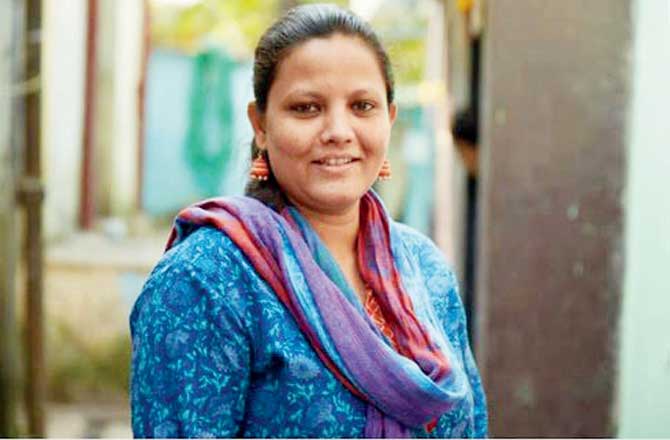
Mumtaz Shaikh
In April, PHS decided to conduct thorough research across Mumbai's slums. The report titled, Moving Towards Universal Water and Sanitation Access, was published last week. "The city of Mumbai sources and distributes over four billion litres of water every day. Despite this abundant supply, over two million people are denied legal water access in the city, and live amidst severe water uncertainty. The COVID-19 pandemic has increased the need for water and hygiene access while the lockdown, announced in the interest of public health, has exacerbated this already dire water access scenario. Even as public service announcements were issued reminding people to wash their hands regularly with soap, at least two million people in Mumbai wondered how to follow such recommendations without regular, adequate, and affordable water access," the report states.
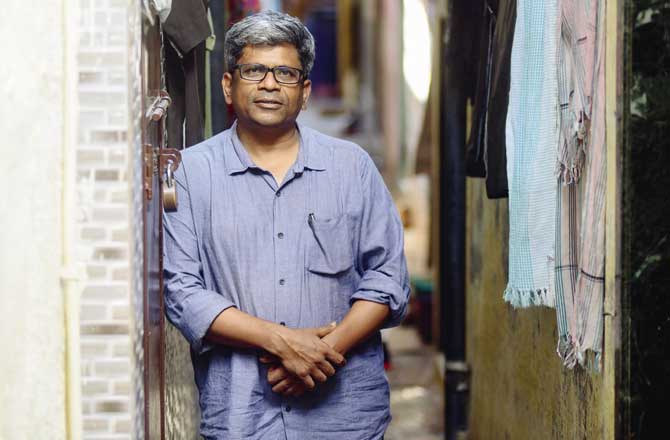
Pani Haq Samiti convenor Sitaram Shelar wrote to the High Court and the BMC to make temporary water provisions in slums during the pandemic. Pic/Sameer Markande
A 20-second handwash—as per WHO recommendations to prevent the spread of the virus—requires a minimum of 0.5 litres. "But, a family of five living in a notified-slum of Mumbai, receiving less than 60 litres of municipal water supply per day, would use 25 litres or over 40 per cent of their water supply just for washing hands. The remaining water would then have to be split between all other domestic uses like drinking, cooking, washing and bathing," the PHS report adds.
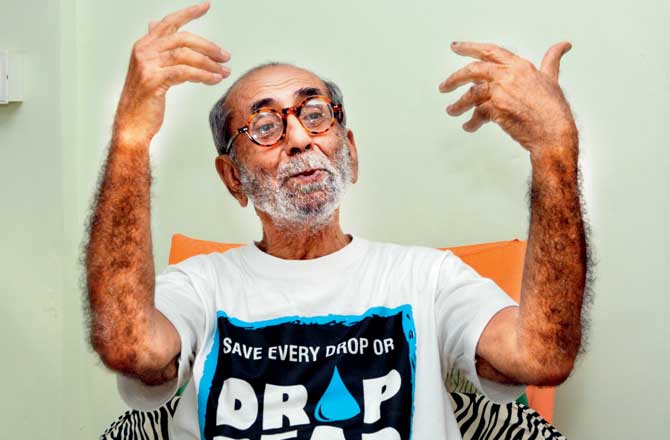
Aabid Surti of Drop Dead Foundation thinks residential societies spotted with overflowing water tanks should be penalised by the BMC. Pic/Satej Shinde
Women have been the most vulnerable during these times. Women's rights activist Mumtaz Shaikh, who made it to BBC's inspirational 100 Women campaign 2015, informs, "Cops were beating up men who were breaking quarantine norms to fill water. Menstruating women, on the other hand, were going days without taking a bath. In these unhygienic conditions, they were cooking food for the rest of the family and tending to toddlers. How does the government expect to contain the virus?"
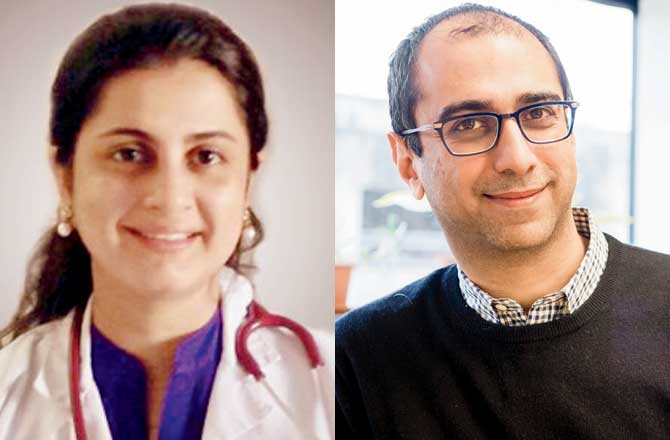
Dr Ayesha Sunavala and Nikhil Anand
In a fact sheet released by the UNICEF in May this year, it suggested the installation of temporary hand-washing stations at critical locations. Listing types of taps to limit cross-contamination in the context of COVID-19, the report said, "Handwashing stations are not meant for dispensing drinking water and should be clearly labelled as such. The facility should easily accommodate soap. In the current pandemic, the setup of multiple-user facilities should allow a minimum one-metre (or as directed by local authorities) free space and/or partition walls between users to allow physical distancing and minimise the risk of human to human transmission. It should also be accessible to the disabled population."
In its report, PHS recommends an on-ground assessment with the help of ASHA volunteers, adoption of an inclusive MCGM policy for universal water and sanitation access, investment in preventive healthcare, making sanitation economically accessible, establishment of accountability mechanisms to ensure officials adhere to government directives.
Nikhil Anand is an associate professor of anthropology at the University of Pennsylvania. His research focuses on infrastructure, urbanism and environment. Anand, the author of Hydraulic City: Water and the Infrastructures of Citizenship in Mumbai (2017) and The Promise of Infrastructure (2018), says, "It is in times of a disaster like the COVID-19 pandemic that already existing social inequalities are enhanced. What the government doesn't understand is that public health is a public issue. The health of one person makes a difference to the health of everyone. When health practitioners learned this, water supply and sanitation became a part of public service about a hundred years ago. This was also why pyaavs [community drinking water fountains] were built in Mumbai city. There is a history of providing public water standposts that have long been left to rot."
The PHS's most important demand is to invest in new pyaavs or use the existing ones. "The BMC keeps saying they don't have money to invest in healthcare or extend water connections to all homes. It is all humbug. Every day, approximately three billion litres of water comes to Mumbai city. It is enough for everyone. Unfortunately, the government is coming in the way of people getting access to it," Anand argues. Aabid Surti, water activist and founder of the Drop Dead Foundation, agrees. In the last 13 years, his team has visited over 2,000 houses in Mira Road areas to fix leaking taps for free. "Security guards who fill up water tanks in residential societies are known for wasting thousands of litres of water daily, letting the tank overflow for as long as 30 minutes. We wrote to the BMC to penalise such buildings for wasting precious water that could otherwise be used by the urban poor during the pandemic. But I never got a response."
Dr Ayesha Sunavala, consultant—infectious diseases, PD Hinduja Hospital and MRC, thinks that along with frontline workers, the urban poor should get vaccinated first against COVID-19. "Expecting frequent hand-washing or any sort of exemplary sanitising measures from the urban poor is unfair. It is unfortunate that they are aware of what they need because now everyone has access to the Internet, but they cannot implement prevention behaviour due to lack of access to water."
Dr Sunavala thinks an immediate solution is to form a public-private partnership, so that NGOs can step in and help them. "Mumbai's infection numbers have come down. But as doctors, we are seeing patients daily and anticipate a second surge."
.5 lakh
Amount of water a 20-second handwash takes
25 lakh
Amount of water a family of five in Mumbai's slums would use of their meagre 60 litre supply just to wash hands
Employment and income
PHS surveyed 292 households via primarily telephonic interviews conducted in the months of August and September this year, of household heads with an average age of 35.92 years. Only 4.83 per cent respondents had permanent jobs that offer financial security, including 2.6 per cent respondents who work in the informal economy simultaneously. About 9.26 per cent of the employed respondents reported pending salary payments for work done before the lockdown which their employers were unable to pay.
Keep scrolling to read more news
Catch up on all the latest Mumbai news, crime news, current affairs, and a complete guide from food to things to do and events across Mumbai. Also download the new mid-day Android and iOS apps to get latest updates.
Mid-Day is now on Telegram. Click here to join our channel (@middayinfomedialtd) and stay updated with the latest news
 Subscribe today by clicking the link and stay updated with the latest news!" Click here!
Subscribe today by clicking the link and stay updated with the latest news!" Click here!










